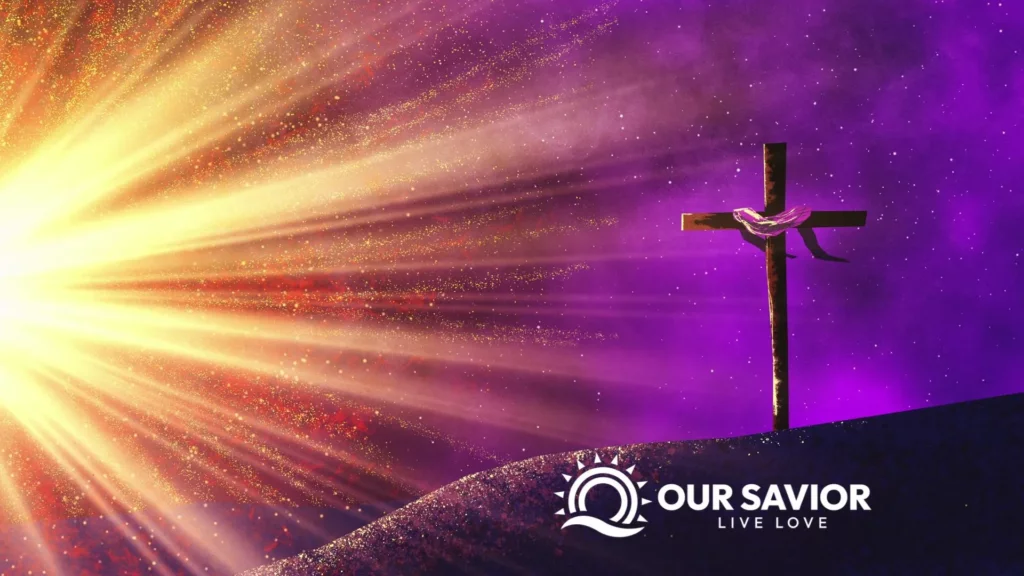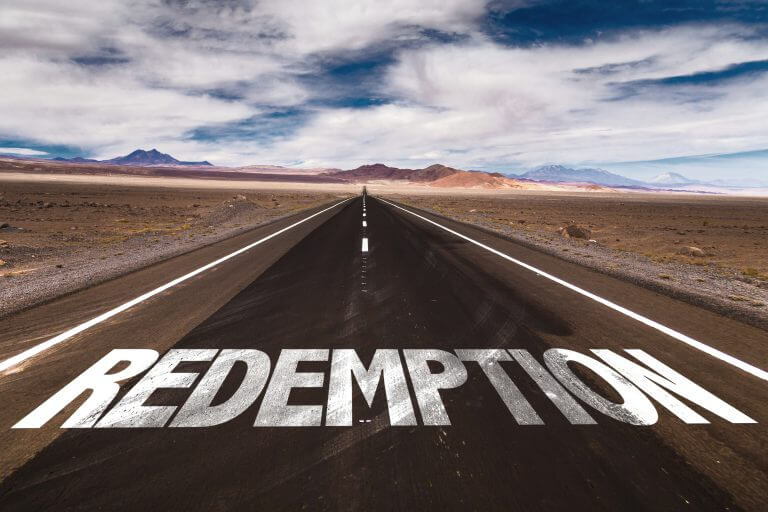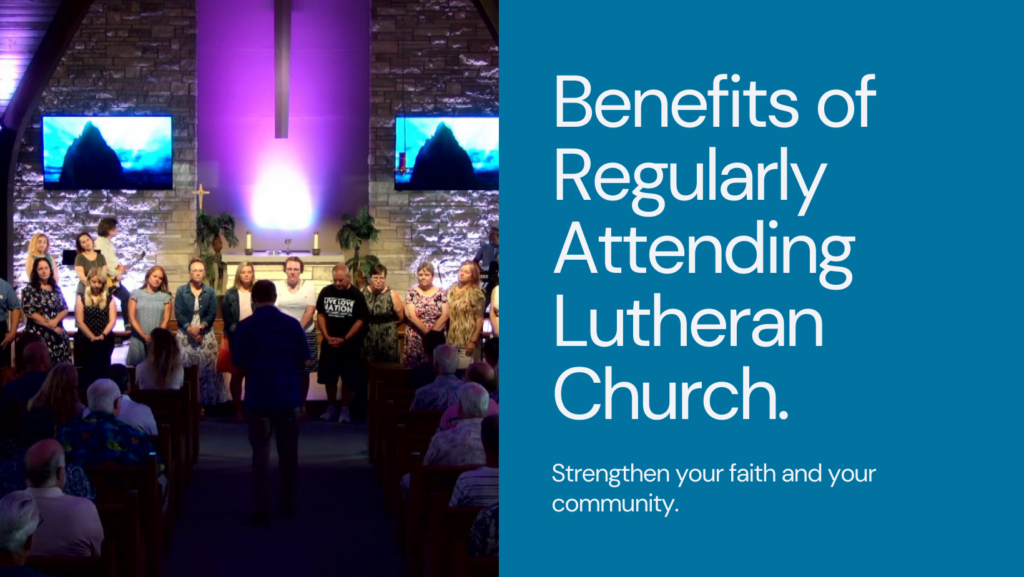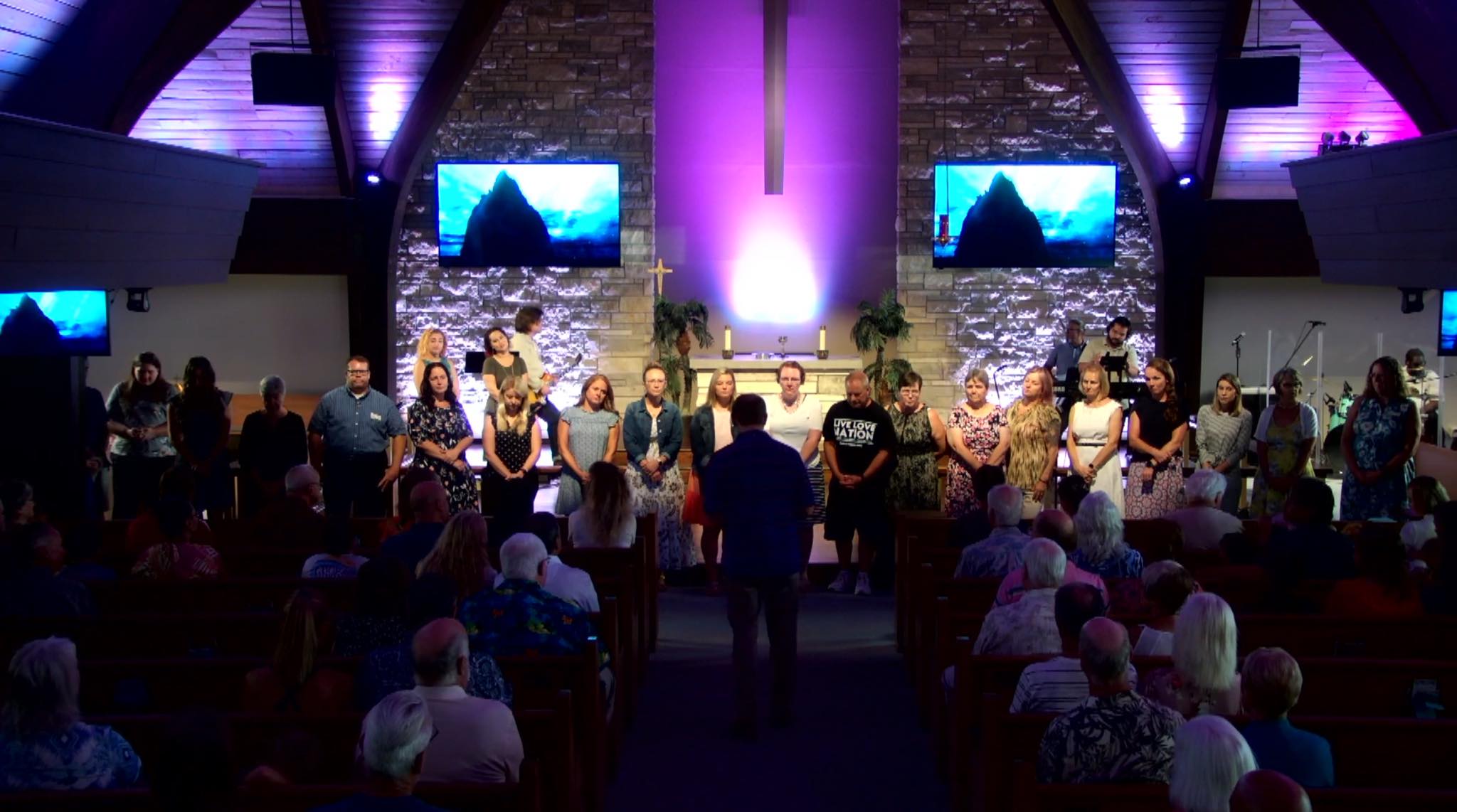God’s grace changes our heart so that you and I can live a gospel-shaped life. And it is amazing how God gives illustrations. God gave me an illustration this morning, as I left home this morning. We are living temporarily in Indian rocks beach, which is a good hike from here. And so I got up this morning, I’ve got my cup of coffee, I made myself turkey roll-up, and I’m driving down the road down golf Boulevard and I’m driving down the road, it’s dark outside, as I’m coming to work. All of a sudden, I see this little red beam from over my right hand side. As I kept driving, getting closer to this little red beam, that little red beam was coming out of the side window of a white Yukon, with the Pinellas County Sheriff’s Department written down the side of it. So sure enough coffee in hand, I’ve got 91.5 I’m singing my praise music, I go past this fine officer, and he comes behind me and lights me up. Okay, first thing in the morning, Sunday morning, I pull over. And he comes up to me. And you know, he we have limited allegedly, allegedly, I was exceeding the speed limit. And so he pulled me over, you know, he just checked my ID and everything. And he had grace, he showed me some grace. And just simply let me off with a warning. You know, and so for a moment, just for a moment, my heart had an attitude. You know, I mean, you know, when that light goes off behind you, your company attitude right away, and then all of a sudden God’s grace, my healed my heart. And in all honesty, I learned from grace this morning, I learned from that officer’s grace, as I drove the rest of the way into church this morning, following every law, every speed limit every law that there was I learned from his grace.
So it’s amazing how God gives us examples, right? There was friction. So it’s all you know, Grace changes everything. And I was thinking as I was getting prepared for this morning’s message, I absolutely love Pastor Futch’s stories, you know, and I was thinking about some of the stories that pastor Futch told. And you know what, he’s a lot like one of those little rascals, isn’t he? You know, he and Spanky would get along great. I don’t have any good stories. I mean, I was a good kid, when I grew up, you know, and so I don’t have any stories. As Pastor Futch has, you know, I get along with my neighbors. I don’t have any issues with garbage being thrown in my garbage can, you know, my wife and I, if she wants to do dishes in the dishwasher, I’ll let her do dishes in the dishwasher. It’s no big deal. And so I’m kind of easy to get along with. And so I’m thinking myself, I don’t have good stories like that. And then I started to think about it just a little bit. And I grew up in Parma, Ohio, which is the west side of Cleveland. I went to Bethany Lutheran Church in school from the time I was in kindergarten all the way through eighth grade. Now when I was a kid, okay, Mike Moses was the principal, Moses scared the daylights out of me. He really did. He appeared to me as a child to be this very large, grumpy old man who was just waiting, just waiting to get me in trouble and to delve out punishment. In reality, Mike Moses was about yay high and very wide. All right, and as I grew up, he was one of the most loving, jovial, joyful people I ever met. I mean, he was just filled with the Spirit. But you know, I was sitting back thinking as I grew up in Bethany, there were times that I was disciplined when I grew up in Bethany. I remember one time distinctly being paddled. Remember the good old days when you got paddled in school? I got paddled in school. And I actually remember what it was that I did. In our school at Bethany Lutheran, we had speckled floors, a lot like many educational institutions. Mrs. Maliki my eighth-grade teacher would be up there writing on the chalkboard. Well, we laid our hands on these little BB’s. Okay, and she’d be up there writing on the board, and a couple of us we through BB’s at the board there. And you know, she’d hear it she’d look and she’d look at a speck of foreign he can’t see anything because the BB’s were camouflaged by the floor. Well, this went on for weeks. We had a lot of BB’s, this went on for weeks. We kept shooting BB’s until what happened was when you walk on those babies, it would make a pencil mark on the floor. So the maintenance man finally figured out what was going on. Okay, in the trap was set. And sure enough, she turned around pulled me in to my buddies, and that was it. We actually got paddled. I don’t Mrs. Medic I think had it out for me. But that same year, I remember getting my mouth washed out with soap. I don’t remember what I said or how I said it. But I do remember going down to the bathroom by the front office of the school and she had a brand new bar soap. She was waiting for me. She had a brand new bar soap, I had to put that soap in my mouth and wait a certain amount of time before I could take it out.
Now, the reason I’m sharing these stories with you, there are some of my early memories, memories of behavior modification, right? I mean, these were teachers trying to modify my behavior. And we’ve all grown up with behavior modification, right? We learn over time to do and to say certain things in order to make life work. If I want to get along at work, if I want to get along with my spouse, if I want to get along with people, my community, I behave. I speak a certain way. And over time, we’ve all learned these different filters in our life. And what we do is, when we speak, our words are processed through a filter, before we speak. Well, before we perform a behavior or an action, once again, that action goes through our filter, and we determine whether it’s appropriate or not if it’s going to end well or not. So we developed these filters, but have you ever noticed over time, sometimes things slip out of our filter? It’s like our filter overflows, or our filters got a hole in it? And we say or do something in the middle responses? Oh, no, no, that’s not me. I mean, that’s so unlike me, I would never do something like that. And then we just kind of resolve in our mind, well, I just got to make sure my filter is shored up that my filter, we try to plug all the holes. Well, I’ve always said stop doing what doesn’t work and do something different. Because if we rely upon ourselves over and over again, we’re going to mess up the filter is going to break.
Jesus said this in Matthew chapter 15. What comes out of the mouth, proceeds from the hurt. In other words, if you want a stethoscope to your heart, the mouth acts like a stethoscope, you want to know what’s in your heart. Listen to what comes out of your mouth. And they’ll reveal what’s in your heart. We try and we try hard to filter our words to monitor our behavior. But over time, the filter breaks down.
And ultimately something eventually comes out. And once again, what do we say? Well, we say to ourselves, I am never going to say that again. I’m never going to do that again. And resolve in our minds when we got every good intention not to do it or not to say it. And then we deny Oh, that’s not really me. I mean, what came out of my mouth where I said that? That’s not really me. I did it this morning, deny? I denied it. Allegedly, I was exceeding the speed limit. I mean, don’t we do that all the time?
I’ll maintain instead of denying what comes out of our mouth. We need to listen to it. Because it gives us a good indication of where our heart is at. And our hurts are hurt for evil. I don’t love you. Oh, no, no, no, no. My mom always said I got a good heart. I’m a good boy. What’s that what Jesus says? Jesus says, For out of the heart comes evil thoughts. Out of the heart flows, murder and adultery and sexual immorality and theft and false testimony and slander. Now, every couple of years, there are these sociological studies that are done. And the study’s last question is similar like, hey, if you could do this horrendous crime, and there’s going to be no consequences, you wouldn’t get caught. If you could perform this horrendous crime, would you do it? And it’s shocking how many people say well, yeah, I would. I mean, if I could do it and get away with it. Yeah, I’m going to do it. I mean, it’s amazing how many people agree that they will do four out of the heart comes murder in slander and sexual immorality. I mean, have you ever heard somebody say, oh, maybe it’s even you? I would never do that. I would never say that. And then you do.
See, it’s a matter of the heart. Now, I don’t know about you, but I want change. Because in all honesty, I’ve got attitude. And I say things and I got viewpoints and I’ve got these thoughts. That No, I want to change. I don’t want them I know they’re destructive. And I know they’re wrong. And I know they’re there. They’re not good. And I want them to change. But it’s so hard for us to do it, isn’t it? I’ve gone to the doctor Alaska in the within the last year, I’ve gone to the doctor several different times. And I read what the doctor is going to say, Okay, I can go in and I can say, Oh, you know, my knee hurts. You said you’re getting old. You know, and I can go on I can say, Oh, this hurts or this is wrong. They blame everything. I’m getting old right now. I’m at that point in life where they blame everything on getting old. You’ll get you’re getting older. You’re just getting older. Okay, well, I sat down with my doctor not too long ago and my doctor was talking about cholesterol. Now, I’ve never had a problem with high cholesterol. And so my doctor is talking to me about cholesterol. He’s talking about, you know, the LDL, HDL triglycerides, and then he could tell that he was losing me. I wasn’t really paying attention. So he tried this different tact. He said, I don’t want you to be out exercising, I don’t want you to be out running. And then all of a sudden you fall over because of a heart attack. I don’t want you to be out there doing something and all of a sudden, you get yourself in trouble. And you fall over. And I said, well, Doc, you know, you’ve got more diplomas in this kind of stuff than I do. But you’re wrong. I said you’re never going to catch me out there running. But his point is, you know what I mean, you could be running, you could be successful, you could be married, you could be whatever it is, okay. And if something is you could be looking good and looking strong and looking fit on the outside. But if something is wrong with the heart, you can end very badly. I mean, he, Paul, remember Paul, he wrote 13 books of the New Testament, Paul, that great missionary who, who went around the Mediterranean basin planting churches and in Asia Minor. And as far as Europe, I mean, this great evangelist, Paul says this, for I know that the that good itself does not dwell in me, that is in my sinful nature, for I have the desire to do what is good, but I cannot carry it out. For I do not do the good I want to do, but the evil I do not want to do this, I keep on doing. So now if I do what I do not want to do, it is no longer I who do it, but it is sin living in me. That doesn’t mean this is Paul. And Paul is saying, the good I want to do I don’t do and the very evil, the very things that I don’t want to do, I find myself doing it over and over and over again.
In Luke chapter 11, that Jesus was talking to his disciples. And Jesus said this if you then thought you are evil. I mean, he’s talking to his handpicked disciples. He said to his disciples if you guys are evil. And these were the men he was going to use to proclaim the gospel around the world, you see, being the very best version of you, is still evil, is still sinful. And when we finally catch on when we recognize the truth that we mess up, or that we said something, or we did something, then we apply the moral law to the act of our heart. We just promised ourselves you know what I’m going to resolve to do better, I’m not going to say that, again. I’m not going to behave like that again. And we attempt to save ourselves, we think we can fix it ourselves by our own strength, our own power, our own intellect. And when we do that, we’re focusing on self, we’re making ourselves God, we think we can save ourselves, and we’re enhancing our own self-centeredness. It’s all about me. And ultimately, there’s no change. I mean, even Paul, once again, oh, what a wretched man I am. Who shall deliver me from the body of this death? Who can deliver me? See, it’s only grace that can change the heart. It’s only by God’s grace and God’s power that we can live these gospel-shaped lives. It’s only by grace. Remember, this Latin term symbol, use this applicator. We are at the same time justified in the center, we’re the same time saint and sinner only in Christianity, my friends, only in Christianity, are you sinner and saved at the same time. Only in Christianity is it that we recognize the truth that we fall short, over and over and over. By our very nature, we are sinful, and yet, because of God’s character, we’re loved. Because of God, we’re forgiven because of God, we have everlasting life. Because of God, we have victory. It’s the gospel message. It’s God’s grace. And we believe it right. We know it in our minds. We believe it.
But we don’t believe it. Because if we truly believed if we could truly get our arms around it and grasp what grace is, it would transform every aspect of our life. So what is the gospel? Okay, the point of the spirit of the gospel is this. The gospel is good news. And not good advice. Okay, actually, the word in the Greek word galleon means good news. The gospel is good news, and not good advice. Advice. advice is counsel. advice guidance or direction offered with regard to prudent future action. Oh, if you behave this way, then the outcome will be this. Okay. The gospel is not advice. The gospel is good news. News is the report of what has already happened. We just have to respond to it. All of the world’s religions, all of the world’s religions, including sadly, some aspects of Christianity, give advice. Okay, things that you’ve got to do in order to know God, things that you have to do in order to earn God’s favor. Only in Christianity. Is it good news? Good news, what God has accomplished is good news of what God has done for us. All of the world’s religions are founded by somebody. All of the world’s religions are founded by some self-declared prophet are founded by some sage or, or some figure out there. Okay? And all the world’s religions say, here’s the way to God. You want to know God, that this is what you’ve got to do. This is the way you’ve got to follow in order to meet God. Only in Christianity, my friends, Does God become incarnate? Only Christianity? does God say come down to us and say, I am God, come to find you. I came to do what you could not accomplish on your own. That’s the gospel. That’s grace, God doing for us what we could never accomplish another way of saying it’s kind of like this. The Gospel does not come through Jesus Christ; the gospel is Jesus Christ. And that’s why Paul could boldly proclaim, for I resolved to know nothing while I was with you except Jesus Christ, and Him crucified. Now mean, Paul thing I, when I was with you, I don’t want to know anything else other than Jesus and Him crucified. Now we know it’s an over exaggeration. But what Paul is saying there is keep the first things first. Keep makes sure it’s, you know, keep your priorities straight. It’s all about grace, God’s undeserved, unearned, unmerited love for you, you did nothing to deserve it, you did nothing to earn it in any way. But simply because of who God is, you are loved and you are forgiven. Paul understood that. And so Paul lived his life fully reliant on the gospel, fully relying on Jesus. He writes in Galatians, chapter two, a person is not justified, declared innocent made, right, so a person is not justified by the works of the law, but by faith in Jesus Christ. So we to have put our faith in Christ Jesus, that we may be justified by faith in Christ and not by works of the law. Because by the works of the law, no one will be justified. No one will be justified. See, the determining factor in our relationship with God is not our past. That determine determining factor in our relationship with God is Christ pass.
And so the point of the spirit of the gospel is the gospel takes burdens off of us. The Gospel takes advice, puts burdens on advice, says this is what you’ve got to do in order to be safe. The Gospel says no, no, no, it’s been done for you. It was interesting in some of the research getting ready for this morning’s message, I ran across some research about john and Charles Wesley, the early founders of the Methodist Church, okay, at one point, they were with one of their friends, and the three of them, they were actually reading from Luther’s commentary on the book of Galatians. And the three of them were reading aloud to each other. Now, at this point, they were not really fully converted. Okay, and they were studying and they were reading, and this is what they read, what, we have nothing than to do, no, nothing but be found in him of who God has made unto us our wisdom, our righteousness, and our sanctification, our redemption. It was at that point, when they read those words, what we have nothing to do nothing other than be found in Christ, that they came to faith. That God’s Spirit was at work in them. They talked about, they were so overwhelmed by the grace and the love of God, that they began to cry, they began to weep. They couldn’t. They were so filled with such joy that when they left the house, they could barely feel the road under their feet. The Gospel takes burdens off. There’s an account of an old farmer. His name was Nathan Coles. He was an illiterate farmer who lived up in Connecticut in the 1700s. He went to listen to George Whitfield, preach George Whitfield, and we don’t talk about him too much. But George Whitfield was this American evangelist. He preached over 18,000 sermons to over 10 million people. And he wants to hear one of Whitfield’s sermons. And he Nathan Cole says, My hearing him preach gave me a heart wound. By God’s blessing. My old foundation was broken up, and I saw that my righteousness could not see me. To get that he finally understood it. The burdens were lifted off of him. It wasn’t his actions. It wasn’t his own righteousness, I could save him, but it was only by Christ. Now I’m bringing this to you because straight up in the Christian church, here in our Savior, it’s easy for Christians to fall down two different paths of advice-giving, okay, and in all honesty, I hear it. I hear, you know, it’s like I but it’s easy for us to do this. One is legalism, and the other one is relativism. Okay. legalism is if you follow the rules, right? In our as a good number of Christian churches out there, that whether it’s explicitly it’s usually implicitly they teach legalism now they have a high view of the Bible.
Through their teaching, oftentimes, implicitly, they say that unless you do this unless you go to church so many times unless you don’t drink alcohol unless you don’t dance unless you don’t do unless you do these things or don’t do these things, well, then you’re really not a Christian. And they place all of these extra-biblical laws and rules on you, my friends, that legalism is putting a burden on not taking it off. And when you do that, it just works righteousness, you lose the gospel. Another path that many Christians take is relativism. I mean, this is running rampant in our world today, relativism, okay. It’s just basically it’s this is cultural connection; you just need to be connected to this group of people. No longer talking about judgment, no longer talking about the law. It’s just love, love, love, love. All you need to do is be part of the group join the club, you practice love, joy, peace, equity, do not rock, rock, but also that’s this new legalism. Because unless you do these things unless you belong to this club, unless you do these things you’re not saved.
Charles Wesley wrote 6500 hymns, and one of his hymns, He says this amazing love. My chain fell off. My heart was free. I mean, do you get it? He finally understood the gospel. You’re amazing love. My chains fell off and I was free. That’s what the gospel is. It’s this complete freedom. The burdens are taken off of us. It’s not you. It’s all God. And because of that grace, we can live these gospel-shaped lives because of grace. Our hearts are changed.
Tim Keller is a pastor up in New York City, Redeemer Presbyterian Church. And Tim Keller tells the story that years ago, he was preaching and this young lady walked in the door. And he recognized her, you know, saw her and he said she came for a couple of weeks. Well, after one service, one Sunday morning, he went up to his young lady and, and just introduced himself and began to talk with her. And his young lady says, I’m new in town. I work for a major television network. And she said I made a horrible mistake. She said the mistake that I made is a career-ending kind of mistake. And she fully expected to get fired. Well, she didn’t see her boss remediate boss. You know, he had a lot of social credibilities. He had credibility within the organization. He took the blame for her.
Her boss went to the higher-ups and said, you know what, it’s my fault. I didn’t train her properly. I didn’t prepare her for what was coming her way. And he took the blame for her. Now she went to her boss, and she said, I don’t understand why did you do what she did? He said, don’t worry about it. It’s all okay. It’s all okay. And she’s like, No, I don’t understand. Why would you take the blame for me? I mean, I’ve had plenty of bosses who would take the credit for something good that I did. But nobody would ever take the blame for something I did wrong. Why would you take the credit for me? To what he told her? I’m going to say this once. And you made me say it. I’m a Christian. He said, I’m a Christian. And my life is based on a man who took the blame for me. And I tried to live my life out the same way. I am forgiven. He took the blame for me, and I want to do the same thing hit see his motivation was not law. His motivation was gospel because he was forgiven. Because he somebody took the blame for him. He wanted to do the same thing. It was the gospel that shaped his heart that he showed his heart and shaped his life.
Here are some quick biblical examples of this. Peter. Peter was a Jew, Peter came to Christ, he was one of the apostles, Peter is going to eat dinner with Gentiles who are believing. But all of that tradition, all the old ways of doing things crept back upon him. And in Galatians chapter two, he didn’t want to eat with the Gentiles, because the Jew didn’t eat with Gentiles. Well, Paul, Paul addressed Peter and Paul did not address Peter with the law. But Paul addressed Peter with the gospel. He said, For, through the law, I died to the law so that we might live for God. I’ve been crucified with Christ and I no longer live but Christ lives in me. The life I now live in the body, I live by faith in the Son of God, who loved me and gave himself for me. See, when Paul addressed Peter, he didn’t hit him over the head. He basically taught Peter, we’re all in the same boat, regardless of race, regardless of culture, regardless of your past. We are all in the same boat and it’s only by God’s grace, that we’re forgiven. It’s only by God’s grace that our hearts are changed. Paul, once again going to the church in Corinth was trying to gather this offering. And Paul when he talked to the People the church in Corinth, he didn’t turn to the law and say God says you got to give 10% he did not even turn to his own epistatic authority. In other words, Paul turned to the gospel. In Second Corinthians chapter eight. He says, For you know the grace of our Lord Jesus Christ, that though he was rich, yet for your sake, he became poor, so that you through his poverty might become rich. See, Paul, the in terms of the law, they give 10% Paul brought the gospel down to bear on them. He said, look at how generous Jesus was with you. He gave his life for you. He didn’t tie his blood; he gave his all. And because of his generosity, because we’ve been forgiven, we’re called to be generous into forgiving as well. Again, Titus says, For the grace of God appeared, that offer salvation to all people. It teaches us to say no to ungodliness God’s grace teaches us to say no, God’s grace, God’s love teaches us just say no to ungodliness because we’ve been loved we want to live for God. So what does God’s What does a gospel-shaped life look like? Paul writes you are not your own. You were bought with a price. That’s love. That’s gospel. God loved us so much, that he very unselfishly chose us. He gave his all for us. And the gospel-shaped life we do the same. We live love unselfishly choosing another’s highest good. There’s a cultural anthropologist out of Cornell University in New York City, and that he’s not a believer. And he asked, what are we living for? What are we living for him, he takes American history and he breaks it down into three chapters? The first one is the glory of God. He said, when our founding fathers came and settled the New World America, we live for the glory of God, that that Christianity so permeated their lives, that everything, their exploration, everything they did was for the glory of God. Then in the early 19th century, it began to shift. It wasn’t for the glory of God, but it was beginning to focus on the nation. They did things for the glory of the nation, the United States, that that democracy would change the world, that democracy would save us that the government would save us that the government could take care of us. And all of a sudden, what took place was, was the glory of God was replaced by nation. And ever since World War Two, he goes on to write that what’s taking place now is the nation is being replaced by self. That we are so self-focused, that it’s all about us that we’re not living for something bigger. We’re living for self. And because we’re no longer living for something bigger, what’s happened in our culture has become more and more fragmented. We’re living for self, not for each other. We’re not living for something bigger, but we’re living for self. And he goes on to say so secularism when you when you’re focused on self, it’s extremely selfish. So many people say, well, religion can fix that, and in religion, not Christianity, but religion. Okay, yeah. Well, religion does teach less selfishness. religion teaches us to be generous with people. But religion itself becomes tribal, doesn’t it? We hang around people like us. And religion can create this haughtiness, where we look down on other people and my friends because of secularism, selfishness, because of religion. We have this declining society. It’s only Christianity. Only in Christianity, do we have fulfillment and humility at the same time? Only in Christianity, do we live for a bigger purpose.
And we know this, the problem is, we just don’t share it. We’re living for a bigger purpose. We’re living for Christ who gave his all for us. And it’s, it’s humbling because we didn’t do it. It’s all God’s grace, who did it for us. By grace, we’re loved by grace, we’re forgiven by grace, we live love. It’s a gift of God’s grace. See, we’re citizens of heaven. And because we’re citizens of heaven, we’re the very best citizens of man. We live for a higher purpose. We live love as we love Jesus, love people, and serve the world. So let’s go back to the beginning. Do you want change in your life? Do you ever reflect on what comes out of your heart? I mean, do you really want lasting permanent change in your life, you’re not going to accomplish it by sheer will. And determination. I think we do in worship. You want to experience a change in life, you want to experience a change in our culture, it’s worship.
Pastor Paul Burtzlaff






